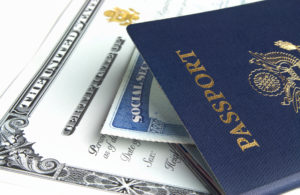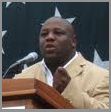17 Apr 2014 Not Even a Clinton Compromise Can Persuade Strident Voter ID Critics

Blue American passport with citizenship documents on white background.
Does Bill Clinton really want to suppress the black vote?
And why, for that matter, is civil rights hero Andrew Young apparently willing to discourage minority, elderly and student from going to the polls?
At least that’s what would be said of these guys were conservative.
But both of these popular liberal icons are effectively putting their political legacies on the line by endorsing a plan that seeks to work with existing voter ID laws.
Clinton calls the idea, which calls for adding photos to Social Security cards in order to meet certain states’ requirements for a valid ID as well as bringing people without valid proof of identity into the 21st century, “a way forward that eliminates error” that helps end controversy threatening to “paralyze and divide a country with significant challenges.”
This very simple plan — adding photos to cards that every American citizen is required to sign up for — was promoted by the group WhyTuesday? and endorsed by Clinton and Young (who chairs that group) during events last week at LBJ presidential library marking the 50th anniversary of the passage of the Civil Rights Act of 1964.
Easy peasy, right?!
Even former president Jimmy Carter is said to support the proposal. But there was one very prominent liberal who wasn’t interested in talking about this voter protection proffer coming from the left: President Barack Obama. When a reporter asked for the President’s reaction to this potential political breakthrough, White House spokesman Jay Carney had no comment — begging off a response because they needed “to review all the implications.”
Obama’s really been no help at all.
While Clinton and Young are earnestly seeking a suitable compromise that will promote clean elections and provide dignity for those lacking the full representation that can come with having valid identification, Obama’s most recent contribution to the voting rights debate (also last week) was to take the stage at Al Sharpton’s National Action Network convention and stir up fears that conservatives were actually suppressing peoples’ votes by demanding that ballots not be left open to fraud. Obama complained that lawmakers promoting polling place protections to help secure the votes of law-abiding Americans from fraud are actually “pass[ing] laws to make it harder, not easier, to vote.”
The notion of putting photos on Social Security cards certainly isn’t the most foolproof plan, nor does it meet with complete conservative acceptance. Senator Rand Paul (R-KY), for example, fears it would create a national ID card. Having a card with ones’ valuable Social Security number featured so prominently may also increase privacy concerns. And, in California, Michael Hiltzik of the Los Angeles Timespointed out that there are more Department of Motor Vehicle offices in California — where people can get traditional state-issued identification — than Social Security Administration offices.
Clearly, current laws may already be the best laws.
There’s also the not so insignificant factor that all of these existing laws — all enacted at the state level — would need to be changed to include the newly-designed Social Security card. It’s a fair bet, however, that legislators would be amenable to this additional form of identification considering that some current laws allow the use of hunting licenses.
But Hiltzik, in his criticism, seemed more concerned that Clinton and Young coming to the table to try to work out a solution is “effectively a capitulation to the Republicans’ hopelessly dishonest and deceitful voter ID laws.”
So forget giving Americans the basic tool to get over the voter ID hurdle, as critics would suggest exists with this simple and commonsense request for proof of identity. Forget about the notion that this new federally-issued photo ID could help people vote as well as help them travel, bank and more easily engage in day-to-day activities in a world that is more security-conscious. No — it’s giving an inch to conservative lawmakers who have enacted (or still seek to enact) a method for people who want to vote to prove they are who they say they are.
While not endorsing the plan advocated by Bill Clinton and Andrew Young, members of the National Center’s Project 21 black leadership network do see the merit in both coming to the table and seeking out a solution to the divide between those who want safe voting and those who would allow ballots to remain susceptible to fraud. From Obama, they see an unwillingness to compromise and a zealousness to exploit the issue for political expediency.
 Project 21 member Hughey Newsome, who recently wrote on the voter ID issue for the Daily Caller, said:
Project 21 member Hughey Newsome, who recently wrote on the voter ID issue for the Daily Caller, said:
President Obama and the White House are accused of politicizing voter ID laws and using charges of voter suppression for their own partisan gains.
It’s actually hard to reach any other conclusion about it when one considers the proposal backed by former president Bill Clinton and former Atlanta mayor Andrew Young and the lack of White House enthusiasm.
Putting photos on Social Security cards would help address any lack of state-issued IDs in minority communities and provide a means that could be used to verify voter authenticity and help with daily business needing ID nowadays.
The White House’s silence on this proposal seems to show that politics, not solutions, is the goal.
 Project 21 co-chairman Horace Cooper, a former congressional leadership staff member and constitutional law professor who also met with United Nations officials on the topic of voter ID in 2012, added:
Project 21 co-chairman Horace Cooper, a former congressional leadership staff member and constitutional law professor who also met with United Nations officials on the topic of voter ID in 2012, added:
More and more Americans now recognize the importance of ensuring that measures are undertaken to guarantee that only lawful, eligible voters participate in the electoral process.
The actions by Mayor Young and President Clinton demonstrate how bipartisan and commonsense these efforts are.
Opposition to this new proposed form of voter ID seems to be based on one of two theories — that it is politically effective to pretend that minorities are facing limits on voting or letting phony voters participate on Election Day assures left-wing political victories.
 Project 21 member Kevin Martin, a Navy veteran and former state employee in Maryland, said:
Project 21 member Kevin Martin, a Navy veteran and former state employee in Maryland, said:
Without fail, progressives talk about how elections should be fair and equitable for all. But when lawmakers make an effort — such as with voter ID laws — the same progressives almost always level unfounded charges of racism.
Progressives will argue that an ID requirement for voting amounts to a poll tax and is unfair for the poor, minorities and the elderly. They’ll also claim that voter fraud and identity theft doesn’t readily exist despite examples that prove otherwise.
Pia Farrenkopf’s mummified remains were recently found in Michigan. Experts estimate that she died in 2008, but records indicate that she voted in 2010. Melowese Richardson actually admitted and served time in jail in Ohio for, in part, voting for President Obama more than once and for more than herself in 2012 (and in past elections). Despite this admission, Al Sharpton — instead of denouncing Richardson for her crimes — embraced her at a recent rally that condemned voter protection laws.
This isn’t right.
Progressives have not given logical reasoning to oppose voter ID laws — especially now that Bill Clinton and Andrew Young are willing to come to the table and offer their own ways to work with current ballot protection laws.
It is long past time for progressives to distance themselves from the lies and disinformation and embrace the facts. The fair and equitable elections they claim to support are best safeguarded when a person shows up to vote with a photo ID that proves their identity.
top photo credit: iStockPhoto



